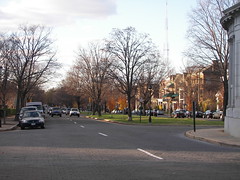More thinking about robust systems
(these days I am thinking I should be a organizational-systems analyst, not a planner)...
One of the things that sucks in dealing with municipal issues is the level of discourse. If you look at how various agencies work from a systems standpoint, when negative events occur on a regular basis, or generate additional work for other agencies, then you can argue soundly that the system-result is flawed.
1. One such example is the sales of singles, and the resultant problems with loitering, littering, petty crime etc. Rampant sales of such products creates more work for police officers. But the cost of providing this service isn't borne by the licensee nor paid by the agency that oversees alcoholic beverage licensing. Doing something that generates the need for police enforcement is the mark of a flawed system.
2. Similarly, the "take it outside" approach to crowd control and security in nightclubs. When problems arise. The perpetrators should be detained, and the police called to cart them off. Putting them outside merely displaces and doesn't interdict (stop) the problem. That's why people get kicked out and then shoot guns and kill people. This is an example of another flawed system.
3. Another example is road engineering. I wrote this on a list today, in response to this article, "Shocker: Speed Limits Are Useless Without Enforcement" from New York's incredible Streetsblog.
A number of us have made this point for some time, that roads typically are "over"engineered to allow high speeds, as are cars. Therefore, for areas where you don't want to encourage people to drive fast (on a road on the edge of Greater Capitol Hill in DC--still urban--a car was clocked by a speed camera going over 90mph late at night, in a zone with a posted 25mph speed limit), change the materials of the road. I myself am fond of stone Belgian Block. With it, you get physical, visual, and aural cues that you should drive more slowly. And it's not likely to be supportive of 90-100mph speeds.

Monument Avenue, Richmond.
Using Belgian block/appropriately engineering roads based on the desired speed in many cases would eliminate the "need" for speed bumps, speed tables, and other road pimples.
So yeah, a truly "robustly" engineered road system wouldn't require secondary enforcement (police writing tickets) to optimize the system, it would engineer the system of pavements to generate the optimal result from the outset.
Labels: change-innovation-transformation, systems engineering, the robust and resilient city



0 Comments:
Post a Comment
<< Home